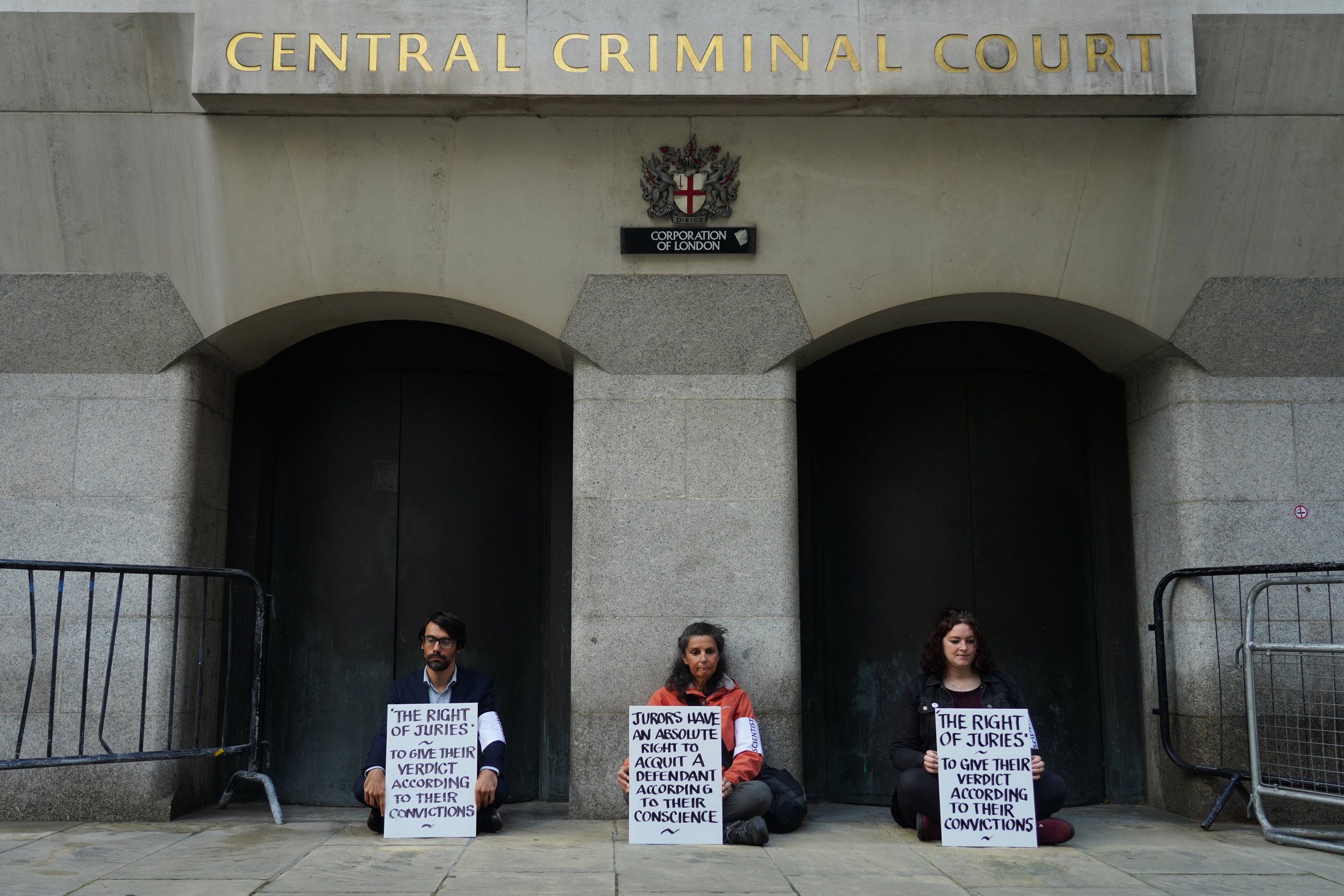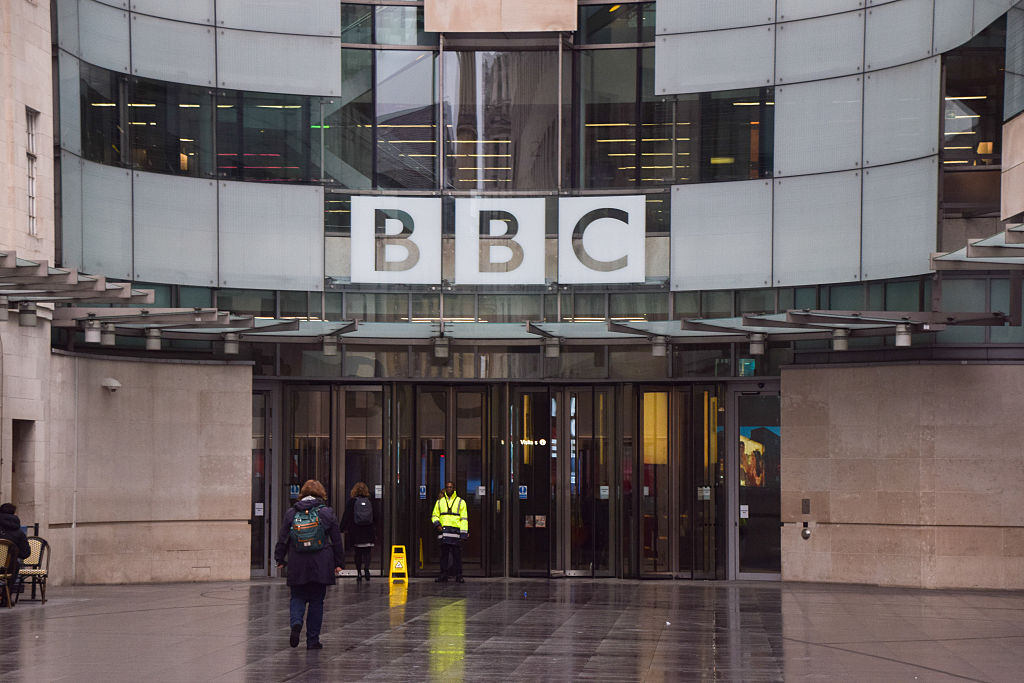On 29 March 2023, a retired social worker from Walthamstow, Trudi Warner, was arrested for standing outside Inner London Crown Court and holding up a banner saying: ‘Jurors you have an absolute right to acquit a defendant according to your conscience.’ Inside, four Insulate Britain activists were on trial for causing a public nuisance. The Solicitor General tried to prosecute Warner for contempt of court; a High Court judge blocked this, claiming it wasn’t in the public interest.
The case marked the beginning of Defend Our Juries, a pressure group which has become a kind of legal offshoot of Just Stop Oil and Extinction Rebellion. Earlier this year, Defend Our Juries organised a mass sit-in with hundreds of protestors outside the Royal Courts of Justice, where 16 Just Stop Oil activists are appealing their sentences for climbing onto a gantry above the M25.On Friday, six of their activists had their sentences reduced by the Court of Appeal.
Defend Our Juries was founded by Tim Crosland, a former government lawyer. In 2020, Crosland lost his job and was fined £5,000 for leaking a Supreme Court ruling on the third Heathrow runway (which had overturned a ruling that the project would be in breach of the government’s climate obligations). He was later disbarred from practising as a barrister.
After the Warner case, his Defend Our Juries group began organising protests outside courts where other climate activists were on trial. The group quickly picked up support from various luvvies, including Chris Packham, Hugh Fearnley-Whittingstall and Juliet Stevenson.
There have been plenty of climate cases for the group to protest against. While some road-blockers and vandals were acquitted – or even not charged at all – in the early days of Extinction Rebellion, in recent times they have tended to be convicted.
Chief among them is Roger Hallam, who last July was jailed for five years for plotting the M25 protest (reduced on Friday to four years). Four of his fellow Just Stop Oil activists were each jailed for four years (now reduced to three). The protest involved 45 activists who climbed above various points along the motorway. Two of the climbers were jailed for between two and three years in a separate trial.
At this point, Defend Our Juries became something of a misnomer; no longer was the group ostensibly defending juries but was openly attacking their verdicts. The group wrote a letter to the Attorney General, Richard Hermer, describing Hallam and his co-conspirators as ‘political prisoners’ and the sentences as ‘one of the greatest injustices in a British court in modern history’.
Defend Our Juries calls the main M25 organisers the ‘Whole Truth Five’. They have publicised a fundraising letter for the Five, which attracted a further troupe of celebrity supporters, including Rowan Williams, the former Archbishop of Canterbury, Danny Boyle and Sandi Toksvig.
Why the ‘Whole Truth Five’? Because, in the imagination of Defend Our Juries, the 12 jurors would have come to a different conclusion had the judge allowed the defendants to turn their trial into a rally in which they were free to make hysterical claims about climate change.
The Defend Our Juries’ website, for example, asserts that climate change is causing ‘the knowing devastation of current and future generations of humanity and life on Earth’. There is plenty of evidence to refute such claims, but a courtroom where people are on trial for causing a public nuisance is not the best place for such a debate, which is why judges in trials of climate activists have sought to limit what defendants can say about their motives.
Having failed to sway the verdicts of 12 men and women good and true, Defend Our Juries has expanded its activities: it has started trying to nobble the nation’s Sir Humphreys. The group has turned its attention to civil servants, and in particular Crosland’s former profession, government lawyers. At the same time, it has morphed, like Greta Thunberg, from climate activism into a general left-wing pressure group which protests in favour of Palestine and migrant rights.
Its activists have started sitting on the pavements outside Whitehall departments, imploring the officials who work within them to act with their ‘conscience’ (otherwise known as agreeing with Defend Our Juries) and accusing them of breaking international law.
During the last days of Rishi Sunak’s government, it wrote to the Director of Public Prosecutions and handed out leaflets to civil servants claiming that ‘government policies such as on deportations to Rwanda, the ongoing supply of arms to Israel, and the “maxing out” on North Sea oil and gas are inconsistent with national and international law and the civil service code of conduct’.
On its website, Defend Our Juries asks civil servants: ‘Are you concerned your work is inconsistent with your code of conduct? Do you know what to do if you are asked to do something potentially illegal?’ It adds: ‘If you are pressed to do something you are not comfortable with, send an email stating that you are acting under duress and copy in HR.’ It cites illegal migration, the ‘Genocide in Gaza,’ ‘Climate Breakdown’ and bringing criminal cases against protesters as issues where civil servants should take a stand. Needless to say, Defend our Juries isn’t quite calling for a full-on bureaucracy where civil servants have outright power; what it really wants is for civil servants to refuse only to take decisions that conflict with the group’s own views.
One recent wheeze has been to block roads outside the Ministry of Justice and Southwark Crown Court and stage an exhibition about ‘political prisoners in history’. The inference being, of course, that climate and Palestinian activists jailed for public order offences are the equivalent of Alexei Navalny, Andrei Sakharov and protestors in Hong Kong.
Defend Our Juries is all for the rights of climate protesters and Palestinian activists to disrupt and vandalise; it does not seem quite so interested, though, in supporting the right of anti-abortion campaigners to protest outside abortion clinics, which has been outlawed through the use of buffer zones.
I asked Defend Our Juries whether it had a view on the case of Adam Smith-Connor, who last autumn was given a conditional discharge and ordered to pay £9,000 in costs after being convicted of breaching a public-space protection order for silently praying for his unborn son outside an abortion clinic in Bournemouth. There will surely be more cases like this: the government has since introduced buffer zones which criminalise even silent protest within 150 metres of an abortion clinic. Defend Our Juries, however, said that the Smith-Connor case ‘falls outside our remit’.
Surely, if you are defending in principle the right to protest, you would want to make at least as big a noise about that case as about the prosecution of climate protesters. The latter, of course, are being prosecuted for blocking roads and causing mass disruption, not silently praying.
While defending anti-abortion campaigners seems to be outside the group’s remit, the Palestinian cause is most certainly not. It has signed a ‘statement of solidarity’ with Palestine Action, whose activists have been jailed for occupying and damaging the property of companies it accuses of supplying the Israeli military with arms. In one case, the group caused extensive damage to a drone factory in Runcorn.
Unsurprisingly, Defend Our Juries calls those arrested for such offences ‘political prisoners’. The lead signatory in the statement of solidarity with Palestine Action was CAGE, whose research director famously called Mohammed Emwazi – an Isis fighter known as Jihadi John suspected of beheading several Westerners – a ‘beautiful young man’. Cage was named in March by the previous Government as one of five groups being investigated over extremism fears.
Like so many things, the inspiration behind Defend Our Juries comes from the US. Its website carries a reference to a piece by David McDermott Hughes, Professor of Anthropology at Rutgers University, New Jersey, published in the Boston Review. It is a reminder of just how parts of US academia have become indistinguishable from left-wing activism. The time for lawful protest over climate change has passed, asserts the piece; what is needed is an escalation of sabotage against fossil fuel infrastructure, designed in such a way as to encourage ‘jury nullification’ – where juries refuse to convict activists in spite of clear evidence of their deeds.
‘Juries,’ he writes, ‘have the power to sow anarchy far and wide.’ How? By refusing to convict climate activists. ‘Judges will not tell them; someone else needs to spread the word about conscientious acquittal. In short, study the map, learn the locale and organise with the jury pool.’ By that, he seems to mean that activists should make sure they commit their crimes in areas where they are likely to find a sympathetic jury.
There’s an obvious drawback to this strategy: it presupposes that a majority of the public share the views of the activists themselves. But fanatics are not called fanatics without a reason; they are called that because their views are wildly out of step with the majority. The public might be generally approving if you ask them whether the government should take action on climate change, but that does not mean they are going to turn a blind eye to a gang who blow up an oil pipeline.
Even McDermott Hughes admits that jury nullification, when it has occurred in the US, has not always been on the side of enlightened opinion; historically, it has quite often been used to acquit white people who have committed offences against black people.
As Defend Our Juries has discovered, the conceit that the UK public are all climate activists at heart is wrong. In spite of the group’s efforts to swing juries in their favour, the good people who find themselves selected for jury service have, as a whole, shown themselves to be admirably resistant to the anarchists.









Comments